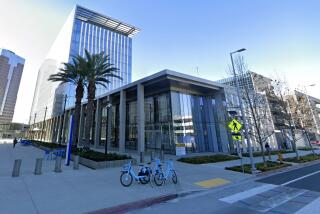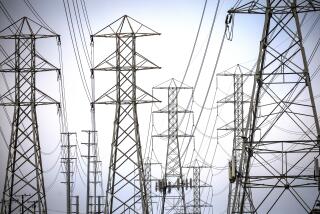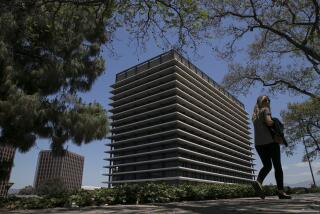Council to Hear Report on Meter-Reading Frequency : Utilities: Complaints mount over a Burbank system in which water bills are estimated in alternate months.
- Share via
BURBANK — Every month, retiree Gerald Walls braces himself for the utility bill.
Since last summer, it has been as high as $599 and as low as $53, he said, because of a new and sometimes erratic billing process used by the Burbank Public Service Department.
“You’re always on edge when you get that thing,” the 58-year-old former truck driver said. “Before, it was just a utility bill, and you could estimate what it was going to be. But now you have no idea at all.”
Until last June, a team of eight city meter readers made monthly visits to thousands of houses and apartments throughout Burbank to record the amount of water and electricity used. Customers were billed accordingly each month.
In an effort to save $150,000 a year in salary costs, meters are now read every other month, and a computer program estimates bills the alternate months.
The system has saved the equivalent of 28 cents each month for each utility customer in Burbank, officials said.
If the computer overestimates one month based on prior usage, the error will always be corrected the next month, when the meter is read, officials said.
The switch will shave four meter-reading jobs from the city’s payroll and enable Burbank to compete better with other utilities in the face of expected deregulation within the industry, said the department’s general manager, Ron Stassi.
But it has also spawned numerous complaints to the department, the city manager’s office and the Burbank City Council, which is looking into the possibility of changing the billing practice.
“It’s an estimate, and it’s not a very good one,” Stassi acknowledged. “The saving grace is you get a true read at the end of the second month.
“The net effect is rates are lower under this system. The problem is the estimates are not working out as well as we had hoped. There’s a lot of customer dissatisfaction, and I’ve had to fix this.”
Burbank’s 45,000 residential electric and water customers have each saved 28 cents a month with the cutbacks, Stassi said.
Walls, whose monthly bill used to average $250, was unpersuaded.
“Fifty-six cents every other month to mess my piece of mind up on not knowing what my monthly costs are? No, it’s not worth it.”
Two years ago, a committee of residents and business people looking for ways to cut costs throughout city government decided that having fewer meter readers was a worthwhile idea.
With the switch to less frequent meter readings last summer, Burbank fell into line with utilities in Los Angeles and Glendale, which check residential electric and water meters every other month.
But in those cities, customers are billed bimonthly based on the actual amount of water and electricity they use, and only a small percentage of bills are ever estimated, utility officials said.
“Customers typically want to pay for what they actually used,” said Fred Puglia, a commercial executive for the Los Angeles Department of Water and Power. “The feeling is, ‘I didn’t really use it, and I shouldn’t have to pay it.’ It appears as though you’re manipulating the customer,”
Burbank officials are considering alternatives, such as returning to the old billing system or following the examples of utilities in Los Angeles and Glendale.
Stassi is expected to recommend the best choice in a report to the Burbank City Council today.
“Customers have indicated they want lower rates,” he said. “Lower rates can be obtained by becoming more efficient, reducing some services and by sales growth.
“Here,” he said in reference to estimating bills, “I think the cost benefits outweigh the service reduction when we get the program straightened out.”
Customers like Walls and Gail Andriuzzo disagree.
“One month I’m paying $71, and the next month I’m paying $222.83. You never know what it’s going to be or how to even budget for it,” said Andriuzzo, 52, who operates a plumbing company out of her home.
“When I get the $71 bill, I think, ‘Whoa. That’s pretty good.’ When I get slammed with a $222 bill, I’m like, ‘Aah!’ With our business you never know what your income will be until the end of the week. Why can’t they go back to the old way?”
More to Read
Sign up for Essential California
The most important California stories and recommendations in your inbox every morning.
You may occasionally receive promotional content from the Los Angeles Times.













